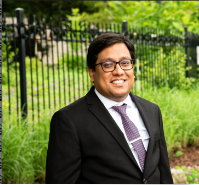Neuroanesthesia Fellowship

Program Director, Dr. Sujoy Banik
The Department of Anesthesia and Perioperative Medicine at Western University is excited to offer a one-year Clinical Neuroanesthesia Fellowship based at the London Health Sciences Centre in London, Ontario, Canada.
Our fellowship is hosted at the London Health Sciences Centre, a renowned national referral center specializing in the management of cerebral aneurysms and arteriovenous malformations.
The Neuroanesthesia department’s large number of cases and a variety of procedures provide a remarkable learning opportunity for residents and fellows. Teaching occurs both in the operating room and during Neuroanesthesia rounds.
Our Neuroanesthesiology Fellowship program is compliant with the Society for Neuroscience in Anesthesiology and Critical Care training recommendations. After the fellowship program's completion, our fellows will receive subspecialty certification by the International Council on Perioperative Neuroscience Training.
Clinical Training
Our fellows receive extensive training in the perioperative management of neurological surgery patients. This includes a wide range of procedures such as craniotomies for tumors, carotid endarterectomy, spinal surgeries, epilepsy surgeries including awake craniotomies, and interventional radiology. Fellows will also have rotations with Neuroradiology and Neurocritical care for 4 weeks.
Research Opportunities
We believe in fostering a robust research culture. Each fellow is encouraged to embark on at least one research project. Additionally, fellows are expected to contribute to the academic community by working on the development of review articles and/or presentations at national and international conferences. We welcome and support further involvement in research and writing activities and commit to providing opportunities to explore various interests.
Fellowship Structure
- Duration: The Neuroanesthesia fellowship spans over twelve consecutive months, including four weeks of vacation.
- Positions offered: 2 fellowship positions per academic year.
- Location: Training is conducted at University Hospital. Service commitment can span across the rest of the hospitals and across our department.
- Service commitment: Fellows commit to 100 service days per year (subject to department policies). This may include rotations in subspecialties outside of Neuroanesthesia. The remaining weekdays are dedicated to subspecialty training, with potential academic time based on productivity
- Call commitment: Fellows may be on call during evenings, nights, and weekends on a rotational basis. The exact schedule depends on the number of fellows. A department-provided pager ensures connectivity during these periods.
Join Us
We invite you to join our dynamic team and be part of a fellowship program that not only hones your clinical skills but also nurtures your academic and research aspirations. At Western University, we are committed to providing a supportive and enriching environment for all our fellows.
“The best thing about this fellowship is what I learned, to deepen my knowledge into what anesthesia is; the medicine, the different therapies, the new technologies, the different anesthetic approaches for difficult patients, and the technical skills. There have been many great people around me during this amazing journey, including the mentors who helped me and promoted my career and of course the patients I had the opportunity to help, with the anesthesia and care during their surgeries. The city of London is one of the top places where I have been able to live; a quiet and nice city of green parks and wide spaces during the summer and perfect amount snow in winter for outdoor sports like snowboarding or ski. Overall, I have truly enjoyed my experience at London Health Science Centre and Western University and will always remember the people of Southwest Ontario.” – Dr. Mauricio Giraldo, Colombia / Canada
Eligibility Requirements for Canadian and Foreign Medical Graduates
- Candidates must possess a medical degree from a University recognized by the Medical Council of Canada (MCC)
- Candidates must have completed an anesthesia residency that is recognized by the College of Physicians and Surgeons of Ontario (CPSO)
- International Medical Graduates do not need to write additional exams, but must be approved by the PGE Office at Western University
- English Language Requirement for IMGs: TOEFL-iBT required to achieve an overall score of no less than 93 with a minimum score of 24 in speaking; IELTS required to achieve a minimum score of 7 in each category.
- All non-Canadian trained anesthesiologists will be required to pass an assessment period taking place over the first 4 - 8 weeks in order to continue with the fellowship (‘PEAP’ – Pre-entry assessment period).
- Please refer to the Application and Requirements page for a more detailed description
Goals and Objectives
Assessment
The Fellowship Director for Neuro Anesthesia will provide face-to-face feedback to fellows at 3 month intervals. The feedback will be based on:
- Daily and weekly assessments of performance by the supervising consultant while on neuro anesthesia assignments
- 360 degree appraisal from staff anesthetists, residents, surgeons, and nurses twice yearly









